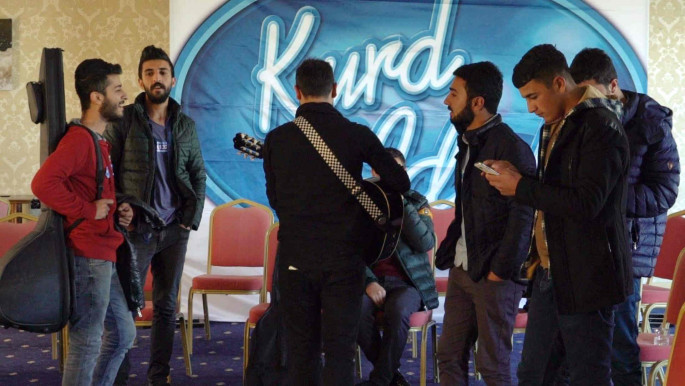
Can the sound of music drown Kurdish sorrows?
Over the next six months, 16 men and women from around the world will perform live in the first ever pan-Kurdish song contest with the hopes of becoming the first "Kurd Idol".
Part of the official "Idol" franchise, KurdSat was involved in negotiations for three years with UK media company Freemantle for the rights to stage it. The 16 participants were shortlisted from a pool of 5,000 contestants and organisers say the logistics were a nightmare - with many hopefuls hailing from Turkey, Syria and various parts of war-torn Iraq.
But the first episode couldn't have aired at a better time.
With stylish young men and women performing a mix of traditional and hip-hop numbers in Kurdish, and a cultivated jury bouncing off each other's witty banter, you could be forgiven for briefly forgetting the ongoing war against the Islamic State group just an hour's drive away, not to mention the economic stagnation here and the endless bickering between and among local political parties.
While there are doubts over what lies in store for the Kurds once the Islamic State group has been defeated in Mosul and beyond - the various components of the Iraqi coalition have not agreed on a post-Islamic State governance plan - the contestants on Kurd Idol know that if they win, they will get an as-yet-unannounced grand prize.
And insiders say it will be no small potatoes for the youth in a region where job prospects are slim - even for those with advanced degrees. Many of the participants are Syrian Kurds who've been displaced from their homes by the ongoing crisis in Syria.
 |
| The competition is open to all young Kurds [Facebook/Kurd Idol] |
Over the past two years, frustration has turned into despair as the once-booming local economy came to a grinding halt.
After a few years of struggle in the aftermath of the US-led Iraq war in 2003, Iraq's semi-autonomous Kurdish region had begun to cash in on newfound stability and security as foreign investments poured in and oil revenues were spent on housing developments, shopping malls and infrastructure projects.
Determined to show the world they were capable of building a city-state to rival Dubai or Doha, five-star hotels and fancy European-style cafes and restaurants sprung up where rundown inns and traditional kebab shops had once stood in Iraq's Kurdish cities. In the city of Rawanduz, close to the border with Iran, one investor even built a ski resort.
Soon, Iraqi Kurdistan had also become a popular backpackers' destination.
|
||
But all this changed in 2014 when Abu Bakr al-Baghdadi declared a caliphate in Mosul. The Kurds stepped forward to the frontlines against this self-styled "Islamic State" and answered calls from the US-led coalition to put their own state-building on hold.
This sacrifice has yet to yield much reward, with the Arab press repeatedly accusing Kurds of using the war to further territorial gains in Iraq - a claim Kurds vehemently refute, saying they are only trying to hold on to what they have. Finally, the Trump administration's "Muslim Ban", has been viewed as the ultimate insult.
Today, the swanky new hotels are running at way below 30 percent occupancy, and barely breaking even with the costs of maintaining operations; they have become a symbol of blighted hope. The crash in oil prices in 2014 further worsened matters and the recent normalisation in rates hasn't had a palpable effect on daily lives.
With no hope in sight, Kurds can only resort to their sense of humour to help buoy sinking spirits.
"Investors aren't coming because they think the Islamic State is just 15 minutes away - actually they're an hour and a half away," joked one marketing executive at a local construction company here in Sulaimania.
His colleague chimed in: "One American company told us they wouldn't collaborate with us because of the sanctions. What sanctions? We said, 'This is Iraq, not Iran!'"
Of course, for many Kurds, it isn't really Iraq either. But how plausible is full-fledged statehood without a stable government and viable, self-sufficient economy? In public, some politicians talk of independence and referendums; in private, they concede that ship may have sailed, if ever it had docked.
Internal bickering among political parties and gravely divergent views over foreign policy add to the existing "presidential crisis" over the Kurdistan Regional Government president's refusal to step aside after his term expired in August 2015.
The public's apathy for local politics is at an all-time high.
And so heated debates on social media and at social gatherings over which singer is most worthy of becoming a pan-Kurdish Idol is a more upbeat alternative to the same old songs about wartime deprivations, political corruption, and financial worries.
Tanya Goudsouzian is a writer, editor - and music-lover - based in Doha, Qatar. Follow her on Twitter: @tgoudsouzian
Lara Fatah is co-founder of Zanraw Consulting and Alfa 5 and describes herself as 'an occasional writer'. Follow her on Twitter: @Lara_FFatah





 Follow the Middle East's top stories in English at The New Arab on Google News
Follow the Middle East's top stories in English at The New Arab on Google News


